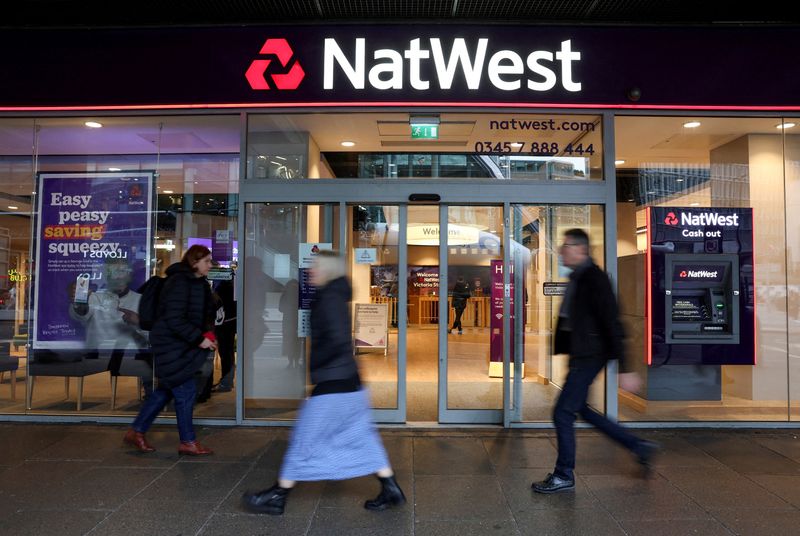By Lawrence White and Sinead Cruise
LONDON (Reuters) -Britain's plans to sell its remaining stake in NatWest would end a "sorry tale" for both the country and the lender, and boost those who feel state support has held back NatWest in recent years, its Chair Rick Haythornthwaite said on Tuesday.
"I think there's a perception there is more intervention from His Majesty's Treasury than there actually is. I think removing that overhang is of value," Haythornthwaite told NatWest's annual shareholder meeting.
"It also brings to an end what is a sorry tale for the UK and a sorry tale for the bank," he added.
British Finance Minister Jeremy Hunt has committed to return taxpayer-backed NatWest to full private ownership by the end of 2026, and has outlined plans to sell discounted shares to the general public to achieve that objective.
"This is a moment when we can think about constructing the future," Haythornthwaite told shareholders, in his first meeting as chair after succeeding Howard Davies earlier this year.
Britain bailed out Royal Bank of Scotland (LON:NWG), later rebranded NatWest, to the tune of 45 billion pounds ($56 billion) at the height of the 2008-9 financial crisis. It has since cut its stake from as high as 84% to below 30%.
Separately, NatWest said it had identified more than 100 priority areas where Artificial Intelligence (AI) could be used to simplify the bank and boost efficiency following a bank-wide review, Chief Executive Paul Thwaite said in a statement to coincide with the gathering in Edinburgh. The projects will help improve staff engagement and increase productivity, Thwaite said.
"The programmes and pilots we ran in 2023 have shown us the potential," Thwaite said, pointing to the consolidation of five legacy systems into one single platform for retail customers.
The outcome of NatWest's review into how AI could help it cut costs comes as lenders worldwide race to harness the technology, amid concerns it could wipe out tens of thousands of jobs and lead to increased risks to financial stability.
So far the evidence is mixed.
AI's rapid adoption could reduce wages, but so far is creating, not destroying, jobs, research published by the European Central Bank showed last November.
There are, however, unanswered questions on whether using AI in banking is positive or negative to financial stability, Bank of Spain Governor Pablo Hernandez de Cos, who chairs the international Basel Committee on Banking Supervision, said last week.

All resolutions proposed to shareholders, including votes on proposals for NatWest to continue buying its shares back in the open market as it exits government ownership, were passed in a vote at the meeting, Haythornthwaite said.
($1 = 0.8080 pounds)
(Reporting Lawrence White and Sinead Cruise; Editing by Mark Potter)